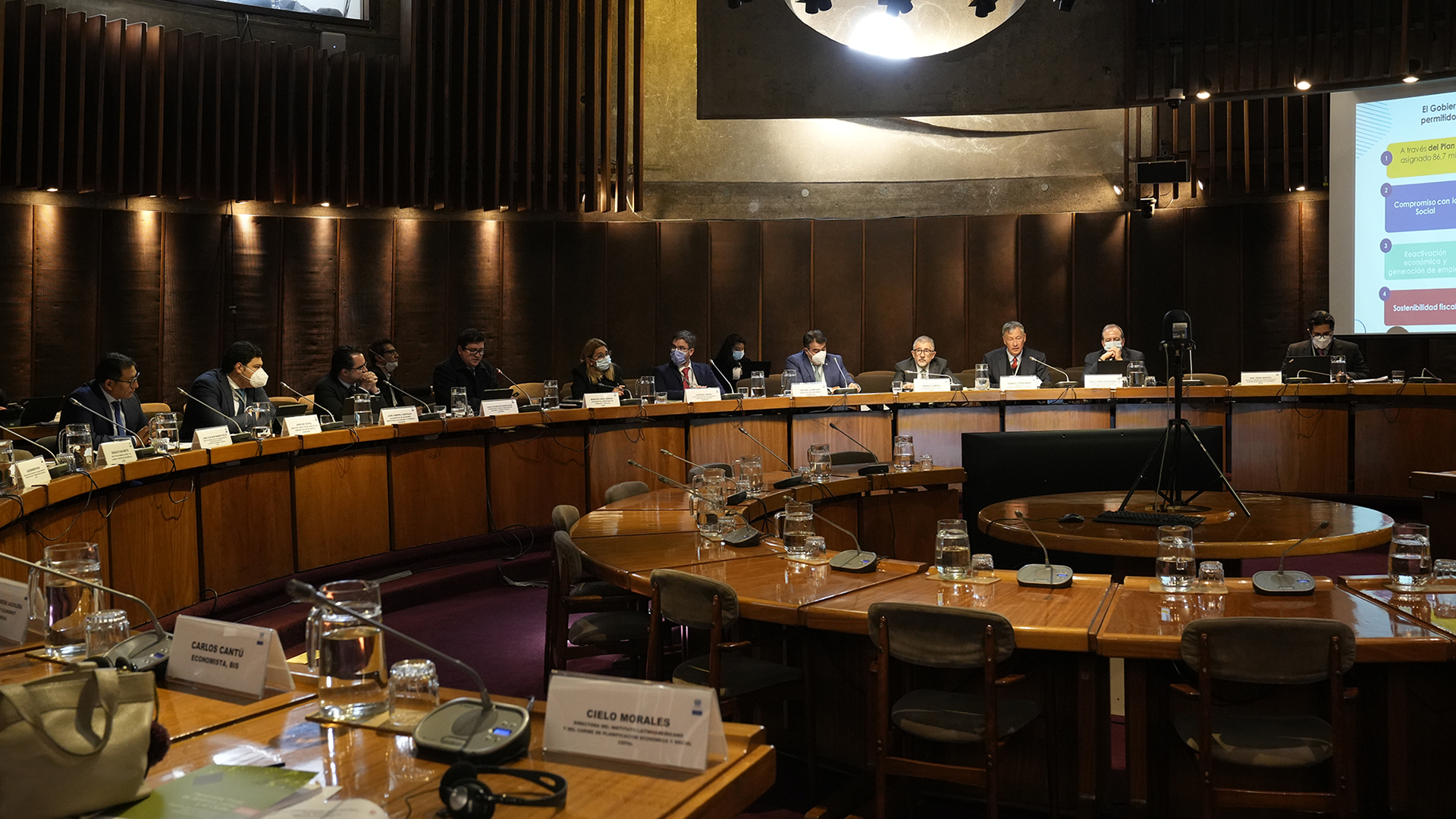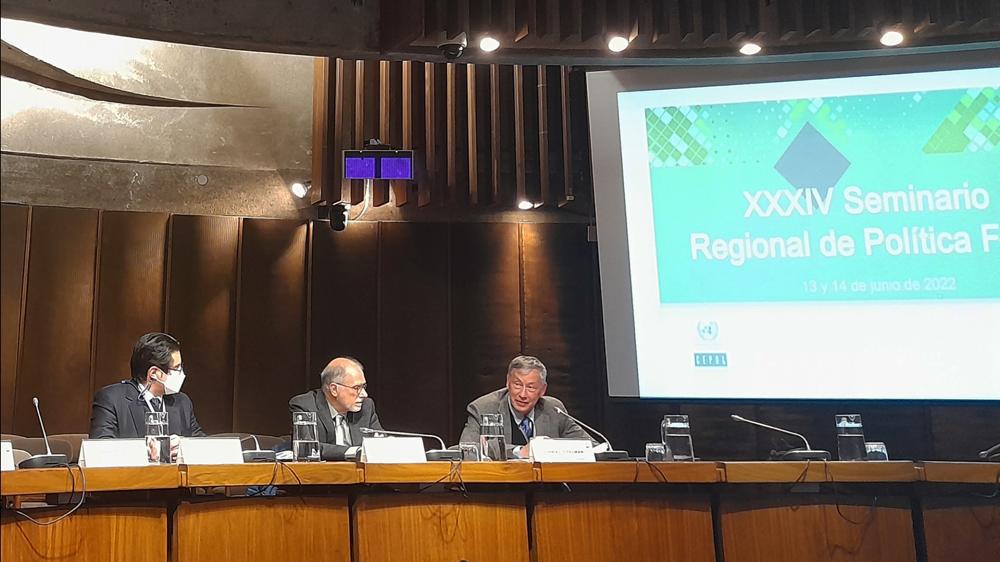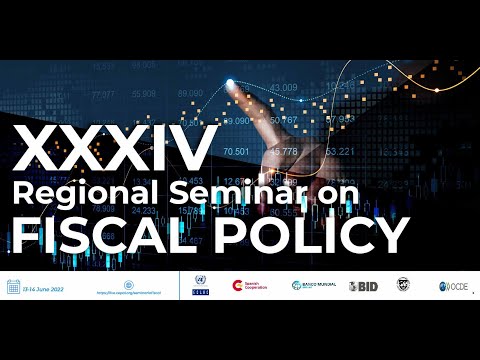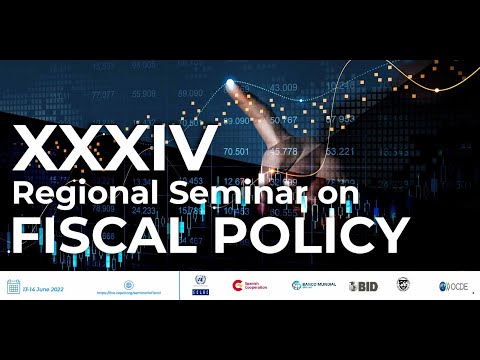Public Revenue Must Be Strengthened to Expand Fiscal Space and Give Sustainability to Spending
Work area(s)
Authorities from Finance Ministries in 12 of the region’s countries kicked off the XXXIV edition of the Regional Seminar on Fiscal Policy, at ECLAC’s headquarters.

The XXXIV Regional Seminar on Fiscal Policy began this Monday at the headquarters of the Economic Commission for Latin America and the Caribbean (ECLAC) in Santiago, Chile. At this gathering – which is one of the main venues for discussing fiscal issues in the region – participants are addressing the fiscal policy challenges for achieving a sustainable and inclusive recovery in a complex macroeconomic context characterized by lower growth and rising inflation. They are also analyzing options for strengthening tax collection and the progressivity of the tax structure, the role of public spending as an instrument for development, and the future of fiscal rules in the region in light of the experience of the pandemic that began in 2020.
In addition to authorities from the Finance Ministries of 12 countries, the participants include prominent experts from international organizations, academia, civil society and non-governmental organizations. The meeting, organized by ECLAC, features the participation of the Inter-American Development Bank (IDB), the Organisation for Economic Co-operation and Development (OECD), the World Bank and the International Monetary Fund (IMF), and is sponsored by the Spanish Agency for International Development Cooperation (AECID).
The event was inaugurated by Mario Cimoli, Acting Executive Secretary of ECLAC, and Claudia Sanhueza, Undersecretary of Finance at the Finance Ministry of Chile (in its capacity as the host country). In his welcome remarks, Cimoli indicated that this seminar is taking place in a difficult context. “Two or three years ago, we were debating amid a scenario that, despite our economies’ low growth, pointed to a stable macroeconomic situation. Today, fiscal policy plays a vital role,” he stated.
“Everyone agrees that fiscal policy will play a decisive role. This panel will debate what kind of policies are needed. Perhaps policies involving rates are not enough, other instruments can be used. Tax expenditures must be reviewed along with the issue of tax evasion and avoidance, among others. The crisis demands intervention, and fiscal policy must intervene,” he said.
Meanwhile, Claudia Sanhueza indicated: “We were emerging from the pandemic and now we are in a difficult year in terms of inflation. It is important to join together and reflect on how fiscal policy – which underlies the social contract of our societies – can help us face this moment in time and look forward.”
During the seminar, ECLAC released the Fiscal Panorama of Latin America and the Caribbean 2022, an annual report in which the United Nations regional organization urges for a fiscal policy design that would bolster tax collection and the tax structure’s progressivity and would orient public spending strategically so it can serve as an instrument for development, with the aim of fostering sustainable and inclusive development.
In its 2022 edition, the Fiscal Panorama analyzes the behavior of fiscal policy in the region’s countries in 2021, a year in which a sharp increase in fiscal revenue coupled with slower public spending led to a reduction in fiscal deficits. Gross public debt contracted moderately to end the year at 53.7% of GDP in Latin America and at 89.1% of GDP in the Caribbean, remaining high as compared with the levels seen in the 20 years prior to the pandemic.
The report also examines the set of fiscal rules that are applied in the region, highlighting the mechanisms that countries used to make these rules more flexible and enable the fiscal expansion that was needed to tackle the pandemic’s effects in 2020. This is an opportune time to review existing fiscal rules and consider reforms to create a fiscal institutional framework that would contribute not only to macroeconomic stability but also to overcoming macroeconomic shocks and to protecting social spending and public investment, the document indicates.
In addition, the Fiscal Panorama analyzes the fiscal frameworks applied to the oil industry and mining in the region’s producer countries. The rise in international prices in the current context underscores the importance of having fiscal frameworks that would allow countries to collect a fair share of the economic income arising from the extraction of goods that belong to the nation. Moving towards the adoption of progressive fiscal frameworks acquires even more relevance in the context of the transition to an economy with net zero greenhouse gas emissions, the report stresses. While the countries that produce hydrocarbons will see fiscal revenue from this activity decline in the future, countries with significant mining sectors could benefit from this environmental transition. As the report indicates, there is a great deal of room for strengthening these fiscal frameworks to bolster this sector’s contribution to financing for sustainable development.
In the framework of the 34th Fiscal Seminar, the results of another report were also presented – those of the Revenue Statistics in Latin America and the Caribbean (2022 version), a publication prepared jointly by ECLAC, the OECD Centre for Tax Policy and Administration, the OECD Development Centre, the Inter-American Center of Tax Administrations (CIAT) and the IDB. This document explores tax trends in the region in 2020, when the tax ratio (or tax burden) fell by 0.8 percentage points of GDP to reach 21.9% of GDP on average, amid the COVID-19 pandemic. Tax revenue, as a share of Gross Domestic Product, fell in 20 of the 26 countries covered in the report during that year. The performance of the region’s tax revenue stood in stark contrast to that of OECD countries, where the tax ratio increased slightly (by 0.1 percentage points of GDP) to reach an average of 33.5% of GDP.
In tomorrow’s session of the seminar (on Tuesday, June 14), participants will examine the dynamics of subnational public finances in the region’s countries, analyzed in a study produced jointly by ECLAC and the IDB entitled Overview of Fiscal Relations between Levels of Government in Latin American and Caribbean Countries 2022. This report presents detailed and internationally comparable statistics on the subnational public finances of Latin American and Caribbean countries. Key issues are analyzed such as regional trends in subnational public finances, progress and challenges with regard to fiscal relations between different levels of government, and the pandemic’s impact on subnational public finances. It also offers a systematized analysis of the main aspects of fiscal relations between levels of government in 26 countries of the region.
Related content

XXXIV Regional Seminar on Fiscal Policy
The XXXIV Regional Seminar on Fiscal Policy is organized by the Executive Secretary of the Economic Commission for Latin America and the Caribbean (ECLAC), through the Economic Development Division…

Participants in XXXIV Regional Seminar on Fiscal Policy Stress the Importance of Strengthening Tax Revenues and Public Spending as Instruments for Development
The gathering, which brought together Finance authorities from 12 Latin American and Caribbean countries as well as prominent international experts, concluded on Tuesday, June 14 at ECLAC’s…

Inauguration of the XXXIV Regional Seminar on Fiscal Policy
Inauguration of the XXXIV Regional Seminar on Fiscal Policy (ECLAC, Santiago, Chile, Monday 13 June, 2022). English version.

XXXIV Regional Seminar on Fiscal Policy (Monday, 13 June)
Recording of the first day of the XXXIV Regional Seminar on Fiscal Policy (Monday, 13 June, 2022) - English translation version. Includes: Session 2 – Revenue Statistics in…

XXXIV Regional Seminar on Fiscal Policy (Tuesday, 14 June)
Recording of the second day of the XXXIV Regional Seminar on Fiscal Policy (Tuesday, 14 June, 2022), English translation. Includes: Session 4 – Strengthening tax revenues and…
Country(ies)
- Latin America and the Caribbean
Contact
Public Information Unit
- prensa@cepal.org
- (56 2) 2210 2040